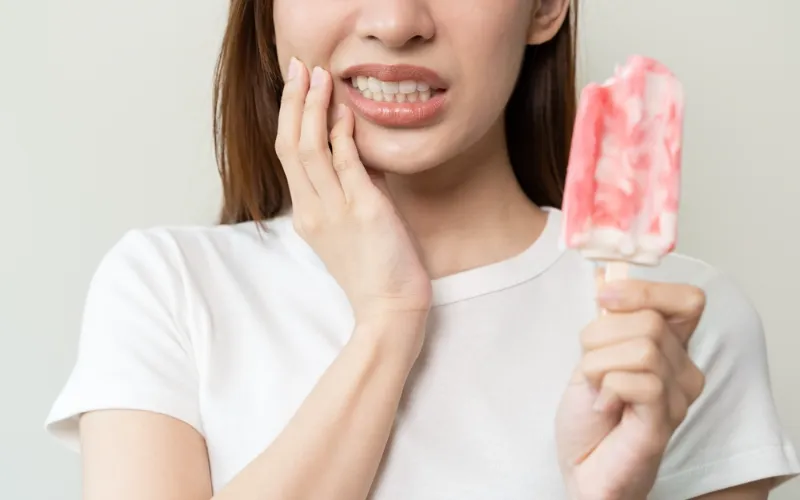Understanding the vexatious condition of tooth sensitivity begins with acknowledging its widespread prevalence. Affecting a significant portion of the population, the acute, often fleeting discomfort triggered by cold stimuli can significantly impair one’s quality of life. This article delves into the multifaceted approach to mitigating the chill-induced twinges in your teeth.
How tooth Sensitivity Occurs?
To comprehend the genesis of cold sensitivity, one must first understand the structural intricacies of a tooth. Enamel, the robust outer layer, shields the more sensitive dentin beneath.
When dentin loses its protective covering due to factors like erosion or receding gums, the microscopic tubules within become exposed. These tubules lead directly to the tooth’s nerve center, and when cold touches these areas, it results in the quintessential sharp pang of sensitivity.
Common Triggers for Cold Sensitivity
Understanding the everyday culprits that trigger tooth sensitivity to cold is the first step toward effective management.
- Dietary Culprits: Common dietary offenders include ice-cold beverages, acidic fruits like citrus, and sugary treats. These can erode enamel over time or provoke instant discomfort in already sensitive teeth. Understanding which foods make your teeth quiver with discomfort allows you to modify your diet accordingly.
- Extreme Temperature Changes: Sudden shifts from hot to cold or vice versa can shock teeth and lead to increased sensitivity. This is not limited to food and beverages; even breathing in cold air rapidly after a warm drink can trigger pain.
- Aggressive Oral Hygiene: Ironically, the very act of cleaning teeth can precipitate sensitivity. Hard-bristled toothbrushes or vigorous brushing techniques wear down enamel and push back gums, exposing the vulnerable dentin.
- Dental Procedures: Sometimes, dental work, like teeth whitening, fillings, or braces adjustments, can temporarily heighten sensitivity. Usually, this is transient, but it’s important to discuss with your dentist if the sensitivity persists.
Diagnosis: Recognizing Sensitive Teeth
The hallmark of tooth sensitivity is a sudden, sharp pain in response to cold stimuli. It’s crucial to discern this from the persistent ache of a cavity or other dental ailments. If the sting of ice cream or a gust of winter air sends you reeling, it’s time to consult with a dental professional.
Learn More about Are Teeth Bones? Find the Teeth Anatomy
Professional Treatments for Sensitive Teeth
Dentistry offers a repertoire of remedies for the cold-sensitive. Fluoride gels and varnishes can fortify enamel and reduce pain. More intensive procedures include bonds and crowns to protect the dentin. Consulting with a dentist can illuminate the best path forward for your particular condition.
At-Home Remedies
Discovering practical and do-it-yourself solutions can provide relief for tooth sensitivity within the comfort of your home.
- Desensitizing Toothpaste: Containing compounds like potassium nitrate, these toothpastes block pain signals from the tooth surface to the nerve. Regular use over several weeks can significantly reduce sensitivity.
- Fluoride Rinse: Available over-the-counter, fluoride rinses can strengthen enamel and reduce the transmission of sensations to the nerve. Consider incorporating it into your daily routine.
- Salt Water Gargle: As an osmotic agent, salt can reduce inflammation and pain. Gargling with warm salt water daily can soothe gum inflammation and mitigate pain.
- Soft-Bristled Brush: Switching to a soft-bristled brush reduces the mechanical wear on teeth and gums, preserving the enamel and preventing further exposure of sensitive areas.
- Avoid Acidic Mouthwashes: Some over-the-counter mouthwashes contain acids that can make sensitivity worse. Look for neutral or alkaline mouthwashes that are kind to sensitive teeth.
Read More about Do White Gums Mean the Presence Of Gingivitis?
Preventive Measures
Implementing proactive approaches is crucial for long-term relief, focusing on preventing and minimizing tooth sensitivity to cold.
- Regular Dental Check-Ups: Regular visits to the dentist can cause problems like plaque buildup or gum disease before they exacerbate sensitivity issues.
- Use a Straw: When drinking acidic or cold beverages, using a straw can minimize contact with teeth, thereby reducing the risk of sensitivity.
- Wear a Mouthguard: If you grind your teeth at night or engage in contact sports, a mouthguard can protect your teeth from fractures and wear, which can lead to sensitivity.
- Mindful Eating Habits: Eating slowly and avoiding sudden temperature changes in your mouth can prevent triggering sensitivity. Also, waiting for a while after consuming acidic foods before brushing can prevent enamel wear.
- Stress Reduction: Teeth grinding is often a stress response. Engaging in stress reduction techniques like mindfulness, yoga, or other relaxation strategies can reduce involuntary grinding, protecting your enamel from wear and reducing sensitivity.
By expanding your understanding of the triggers, remedies, and preventive strategies, you can create a comprehensive approach to managing teeth sensitive to cold, leading to a more comfortable and enjoyable daily life.
Conclusion
While teeth sensitive to cold can be an irritating affliction, a combination of understanding, professional care, and vigilant self-management can significantly alleviate discomfort. Embrace these strategies to not just endure but overcome the chill and enjoy a life not dictated by the fear of the next cold drink.

Dr. Orion Johnson is a dedicated and compassionate dentist committed to providing exceptional dental care to his patients.Dr. Johnson obtained his Doctor of Dental Surgery (DDS) degree from a prestigious dental school, where he excelled academically and clinically. He is licensed to practice dentistry and stays updated with the technology through continuing education and training.
